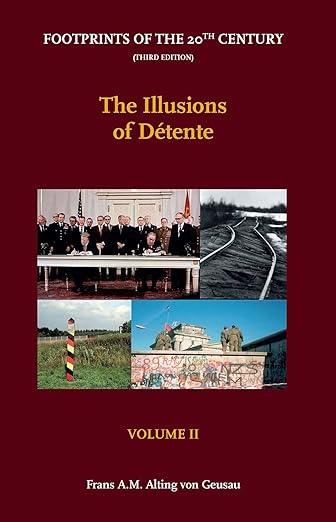Global Law
The use of the term Global Law instead of international law is in fashion today. What do we mean by it? The most acceptable definition I found in Rafael Domingo's, The New Global Law:
"Because the human person is the origin, subject and end of all law, every legal order should recognize and protect the dignity of the person, fons omnis iuris.
The effective legal absolutization of the concept of dignity was one of the great contributions of the twentieth century to the science of law. It marks the transition from international law to global law." (p.134,132).
It equally marks the end of the modern era in international law, said to begin in 1648 - indeed the era in which only sovereign states were deemed to be subjects of international law. I quoted the above in Chapter 2 of my recently published book : Neither Justice Nor Order, as volume V in the series: Footprints of the Twentieth Century. Completed in this year of the 100th. anniversary of the outbreak of the First World War and the 25th. anniversary of the successful peaceful revolution against the "Order of Yalta".
JUST PUBLISHED:
NEITHER JUSTICE NOR ORDER.
Reflections on the state of the law of nations.
This is the fifth and last volume in the series "Footprints of the Twentieth Century", a critical assessment of the state of the law of nations. In the twenty first century the world needs true global law anchored in the dignity of the human person rather than weak international law built on the interests of major sovereign states. One hundred years after the outbreak of the Great or First World War in 1914 and twenty five years after the peaceful end of the Cold War in 1989, little appears to have been learnt – from the scale of disasters that befell the world between the assassination in Sarajevo in 1914 and the annexation of Sebastopol in 2014. The failure to learn from history largely comes from various ideologies of progress, enlightenment ideology in particular. The birth of modern international law, assumed to have taken place in 1648, was no moment of progress, nor was the Congress of Vienna in 1815. The peace of Westphalia reduced the law of nations to interstate law. Vienna legitimized the concept of demarcated linear boundaries. Decisions on war and peace needed no deeper justification than raison d'état as stated by the sovereign. Law-making was reserved to a few major powers. The so-called principle of the balance of power concealed policies of aggrandizement and domination. The leaders of all five major powers in Europe are to be held responsible for the outbreak of war in 1914. The entry into force of the Statute of the International Criminal Court in 2002, might be a first step towards international criminal justice for all and not just for the losers. Nicknamed the 'international community' major sovereign powers offer a dismal record on dealing with such issues as human rights, the use of force, the abolition of nuclear weapons and peace in the Middle-East. Human right policies are still to be oriented to the common good, as understood in the Universal Declaration, rather than to blaming other countries. Nuclear weapons can be abolished only by good example. Peace in the Middle-East cannot be found on the dead end road of a two-state solution.
Throughout the book one finds lightening examples of persons who by their courage and dedication could and did make the difference. Among them are Henri Dunant, Ruth Klüger, Andrei Sacharov, Nelson Mandela and Pope John-Paul II. Justice and order need a transition from international law to global law to be realized.
The book has nine chapters:
Chapter 1. Introduction. Justice, Diversity and the Rule of Law
Chapter 2. Reflections on the History of International Law
Chapter 3. International Law and Human Dignity.
Chapter 4. International Law and The Common Good
Chapter 5. International Law and State Sovereignty
Chapter 6. International Law and the Use of Force
Chapter 7. International Law and the Situation in the Middle-East
Chapter 8.The Art of Diplomacy.
Chapter 9. International Law and the Pursuit of Justice.
Documents:
GL. 01. List of wars involving France.pdf
GL. 02. Napoleons total war.pdf
GL. 03. Great european treaties of the 19th. century.pdf
GL. 04. Henri dunant, memoir of solferino.pdf
GL. 05. The Universal Declaration of Human Rights.pdf
GL. 06. Bolivar, jamaica letter.pdf
GL. 07. Fordham University, New Laws of the Indians 1542.pdf
GL. 08. A Prophetic Challenge to the Church.pdf
GL. 09. GA RES 25 2625 - Declaration of Principles.pdf
GL. 10. chemical weapons convention.pdf
GL. 11. Sykes Picot agreement 1916 The Avalon Project.pdf
GL. 12. The Avalon Project British White Paper of 1939.pdf
GL. 13. 0. Mandate for Palestine 1922.pdf
GL. 13. 1. Convention Concerning the Exchange of Greek and Turkish Populations 1923.pdf
GL. 13. 2. Treaty of Lausanne - World War I Document Archive.pdf
GL. 13. 3. Treaty of Lausanne - list of annexes.pdf
GL. 14. The Avalon Project UNGA Partition Resolution 181 nov. 1947.pdf GL. 15. Roadmap for peace.pdf
GL. 16. We_The_Peoples Millenium Report 2000.pdf
GL. 17. 1. Charter of the Nurnberg Tribunal 1945.pdf
GL. 17. Formulation Nurnberg principles UNSG 1949.pdf
GL. 18. Nuremberg Principles as defined in the ILC.pdf
GL. 19. 1. ICTY statute_sept09_en updated.pdf
GL. 19. 2. ictr_statute 1994.pdf
GL. 19. Statutes of the International Criminal Court.pdf
GL. 20. States parties to the Statutes of the ICC.pdf
European Perspectives on World Order





